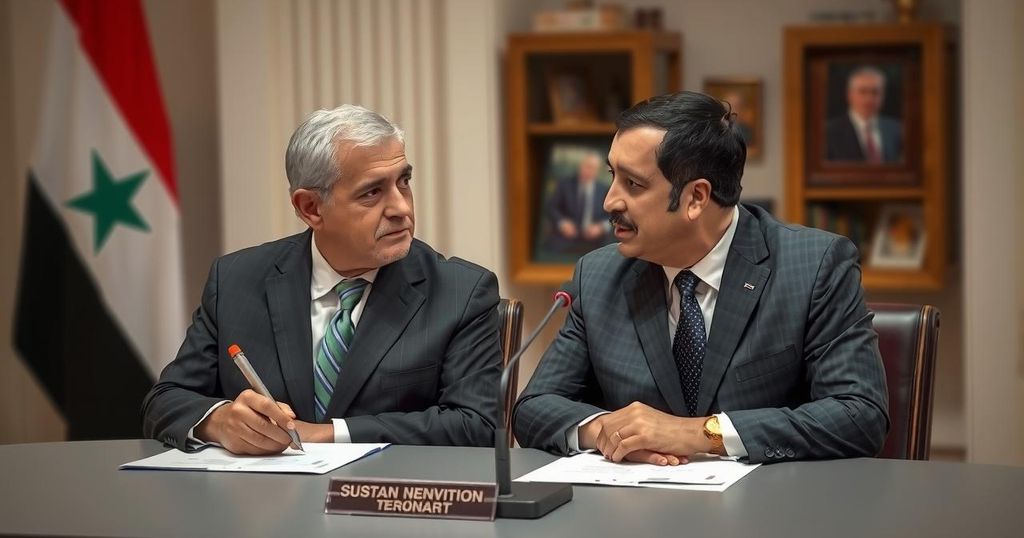Jordan’s Foreign Minister, Ayman Safadi, met with new Syrian leader Ahmed al-Sharaa on December 23, marking a key diplomatic shift as regional powers reassess ties following the Assad regime’s collapse. The meeting underscores Jordan’s historical connections with Syria and its security concerns, particularly regarding border management and refugee influxes. With continuing U.S. involvement and regional instability, Jordan approaches these developments with caution and strategic intent.
On December 23, Jordan’s Foreign Minister Ayman Safadi engaged with the newly established Syrian leadership, notably Ahmed al-Sharaa, leader of Hayat Tahrir al-Sham, which recently claimed control of Damascus following the fall of the Assad regime on December 8. This meeting is pivotal as it highlights Jordan’s historical and geographical connections to Syria and reflects the recent shift in diplomatic postures among regional powers after the regime’s collapse. Jordan, along with Gulf states that had previously sought to reintegrate Assad into the Arab League, must now recalibrate their strategies.
The Jordanian government expressed support regarding Syria’s territorial integrity and institutional stability. Foreign Minister Safadi emphasized this support, underscoring the necessity of securing Jordan’s northern border, which has faced challenges due to the influx of Syrian refugees and security threats from groups like ISIS. Since the onset of the Syrian civil war, Jordan has hosted a significant number of Syrian refugees, while also combatting overarching threats that emerged from Syria, including organized crime and drug trafficking.
Additionally, the United States continues to play a role in the region, particularly from the Tanf garrison, where Syrian rebels are trained, alongside Jordan’s military focus on countering insurgent groups. The strategic location of this U.S. garrison, coupled with heightened security concerns outlined by Jordan’s leadership, remains critical as both Jordan and Israel closely observe developments in southern Syria. Recent meetings in Aqaba, featuring participation from multiple nations, including the U.S., signal ongoing collaboration concerning Syria’s future governance and security.
As Jordan faces challenges from both historical and contemporary perspectives, with ongoing drug trafficking threats now impacted by shifts in Syria’s political landscape, the enduring ties and geopolitical considerations in the region become increasingly significant. The interaction between Jordan and the new Syrian leadership at this juncture could facilitate foreign policy adjustments that address past grievances while fostering stability along their shared border, which holds profound implications for regional security.
The Syrian civil war has dramatically altered the geopolitical landscape of the region, leading to significant changes in alliances and foreign policies among neighboring countries. Jordan has historically maintained a complex relationship with Syria, shaped by geographic proximity and shared historical events. As the Assad regime’s influence wanes, Jordan has seized the opportunity to engage with new Syrian leadership, aiming to secure its borders, manage refugee situations, and counter security threats. The U.S. also plays a pivotal role in regional security dynamics, further complicating the interplay between Jordan, Syria, and surrounding nations. The evolving situation poses both risks and opportunities for Jordan as it navigates its foreign relations in the aftermath of the civil war.
In conclusion, the recent meeting between Jordanian Foreign Minister Ayman Safadi and the new Syrian leadership represents a significant shift in the approach to regional diplomacy following the collapse of the Assad regime. With a focus on security and stability, Jordan aims to address longstanding concerns regarding its border and the implications of the Syrian conflict on its territory. The involvement of international stakeholders, particularly the U.S., underscores the complexity of the situation, as Jordan seeks to realign its strategies in this rapidly evolving geopolitical environment. Maintaining stability and addressing security threats will be crucial for Jordan in the coming years.
Original Source: www.jpost.com






